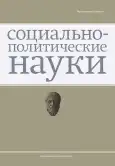The Russian Language as a Tool for Promotion of the Russian World (on the Material of the People’s Republic of China)
- Authors: Andreeva E.Y.1
-
Affiliations:
- Financial University under the Government of the Russian Federation
- Issue: Vol 12, No 4 (2022)
- Pages: 169-174
- Section: Articles
- URL: https://journals.eco-vector.com/2223-0092/article/view/535878
- DOI: https://doi.org/10.33693/2223-0092-2022-12-4-169-174
- ID: 535878
Cite item
Abstract
The purpose of the research. The article is devoted to the issue of the position of the Russian language in the countries of the East. Currently, there can be observed a steady interest in learning Russian in China, on the one hand, and a significant narrowing of the Russian-language information space, a decrease in prestige and popularity of Russian in Europe and North America, on the other. The main purpose of this study is to assess the prospects of the Russian language in China, taking the current political situation into account. The scientific novelty of the study consists in an analysis of the possible prospects for development of the Russian language in China during the following decade, as well as in the study of modern trends and projects of cultural cooperation between the two countries. When considering the latest trends in teaching Russian to Chinese students, the author of the article identifies the main modern problems of teaching the Russian language in the People’s Republic of China and suggests possible ways to overcome them. The practical value of the study consists in the fact that the observations and conclusions proposed in this paper can be used in the development of effective programs for promotion of the Russian language in the East. The research methodology includes the method of synchronous analysis and the method of contextual analysis. Among the general scientific research methods, concretization, systematization, analysis and synthesis of information can be singled out.
Full Text
About the authors
Ekaterina Yu. Andreeva
Financial University under the Government of the Russian Federation
Email: katerina88557@yandex.ru
Cand. Sci. (Philol.); lecturer, research officer at the Department of Foreign Languages and Intercultural Communication (Faculty of International Economic Relations) Moscow, Russian Federation
References
- Belov S.A., Kropachev N.M., Soloviev A.A. Development of the concept and legal support of the state language policy of the Russian Federation. Bulletin of St. Petersburg University. Law. 2017. No. 1. Pp. 42-61. (In Rus.) URL: https://cyberleninka.ru/article/n/razrabotka-kontseptsii-i-normativno-pravovoe-obespechenie-gosudarstvennoy-yazykovoy-politiki-rossiy skoy-federatsii
- Benediktov N.A., Berdashkevich A.P. On the legal foundations of the state language policy. World of the Russian Word. 2003. No. 2. (In Rus.) URL: http://gramota.ru/biblio/magazines/mrs/28_492
- Butaeva K.O., Veber Sh., Davydov D.V. Language, culture, migration, conflicts: economic projection. Moscow University Bulletin. Series 6. Economy. 2016. No. 1. Pp. 3-21. (In Rus.) URL: https://cyberleninka.ru/article/n/yazyk-kultura-migratsiya-konflikty-ekonomicheskaya-proektsiya
- Zyazikov M. Russian language and the priorities of the state policy of the Russian Federation in the language sphere [Electronic resource]. 2016. URL: https://izborsk-club.ru/10303
- Kadochnikov D.V. Goals and objectives of language policy and problems of socio-economic development of Russia. Terra Economicus. 2019. No. 17 (1). Pp. 96-111. (In Rus.) URL: https://te.sfedu.ru/evjur/data/2019/1/kadochnikov.pdf
- Babaev K. The state returns to Sinology [Electronic resource]. 2022. URL: https://chinalogist.ru/articles/kirill-babaev-gosudarstvo-vozvrashchaetsya-v-kitaistiku-22408
- Kuvakova I.M. State language policy, linguistic security and modern “challenges”. In: Language policy and linguistic security: Materials of the second international scientific and educational forum September 25-26, 2018. N. Novgorod: NGLU. 2018. 300 p. URL:https://lunn.ru/sites/default/files/media/news/2018/12/01/yazykovaya_politika_i_lingvisticheskaya_bezopasnost.pdf?ysclid=l585wbck38872148697
- Liu Ch., Zhan L. Development with a 70-year history and the current state of teaching the Russian language in higher educational institutions in China. History and Modernity. 2020. No. 2 (36). Pp. 1-14. (In Rus.) URL: https://cyberleninka.ru/article/n/razvitie-s-70-letney-istoriey-i-nyneshnee-sostoyanie-prepodavaniya-russkogo-yazyka-v-vysshih-uchebnyh-zavedeniyah-kitaya?ysclid=l5867dmcjd131100920
- Novikova A.K. Teaching the Russian language in China: ethno-methodological and ethno-cultural features. Bulletin of the Peoples’ Friendship University of Russia. Ser. Questions of Education: Languages and Specialty. 2011. No. 1. Pp. 68-75. (In Rus.) URL: https://cyberleninka.ru/article/n/prepodavanie-russkogo-yazyka-v-kitae-etnometodicheskie-i-etnokulturnye-osobennosti?ysclid=l585xme4z4135206686
- Okhorzina Yu.O., Salosina I.V., Glinkin V.S. Peculiarities of teaching the Russian language in the conditions of universities in the PRC: Theoretical and methodological aspects. Tomsk State University Bulletin. 2019. No. 441. Pp. 206-212. (In Rus.) URL: https://cyberleninka.ru/article/n/osobennosti-prepodavaniya-russkogo-yazyka-v-usloviyah-vuzov-knr-teoreticheskie-i-metodicheskie-aspekty?ysclid=l585zqk3qw13981494
- Petrulevich I.A., Mesropyan L.M. Modern language policy of the Russian Federation: Main vectors and development trends. Humanitarian of the South of Russia. 2015. No. 4. Pp. 66-76. (In Rus.) URL: https://cyberleninka.ru/article/n/sovremennaya-yazykovaya-politika-rossiyskoy-federatsii-osnovnye-vektory-i-tendentsii-razvitiya?ysclid=l5861b8kqq710629489
- Message of the President to the Federal Assembly of April 26, 2007 (On the situation in the country and the main directions of the domestic and foreign policy of the state) [Electronic resource]. URL: http://www.kremlin.ru/acts/bank/25522
- Rizvanova L.Z. The policy of the Baltic States in relation to the Russian-speaking population. Uchenye zapiski Kazanskogo universiteta. Humanities. 2008. Vol. 150. No. 7. Pp. 140-149. (In Rus.) URL: https://cyberleninka.ru/article/n/politika-gosudarstv-pribaltiki-v-otnoshenii-russkoyazychnogo-naseleniya?ysclid=l5863enzzh91530120
- Sumei L. Teaching the Russian language in Chinese universities: State of the art and prospects. Russian Language Abroad. 2014. No. 4. Pp. 120-123. (In Rus.) URL: http://journal.pushkin.institute/archive/archive/2014/4%20(245)/120_4-2014.pdf?ysclid=l5864kjbyn21943604
- Fenglan G. Peculiarities of teaching the Russian language in Chinese universities. Pedagogical Education in Russia. 2016. No. 12. Pp. 41-45. (In Rus.) URL: https://cyberleninka.ru/article/n/osobennosti-obucheniya-russkomu-yazyku-v-kitayskih-vuzah?ysclid=l58665t56p842605525
- Number of Russian language learners has grown exponentially in China. 2021. URL: https://russkiymir.ru/en/news/284903/
- Simpson C. Language, relationships and skills in mixed-nationality Active Learning classrooms // Studies in Higher Education. 2015. No. 4. Pp. 1-15. URL: https://www.semanticscholar.org/paper/Language%2C-relationships-and-skills-in-Active-Simpson/0edf7a1dd2176cbc4f26686b2f4e09f62296c6c6
Supplementary files








